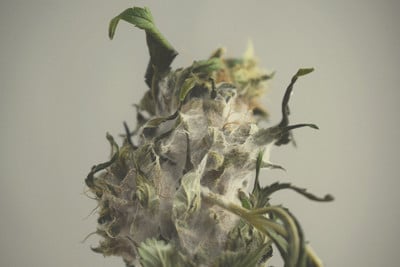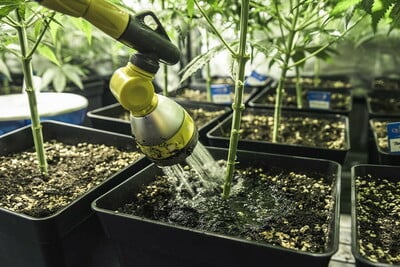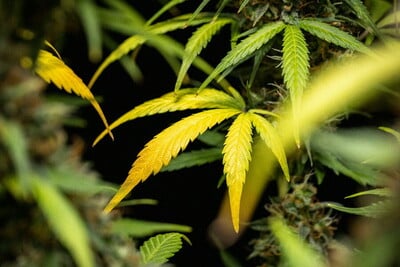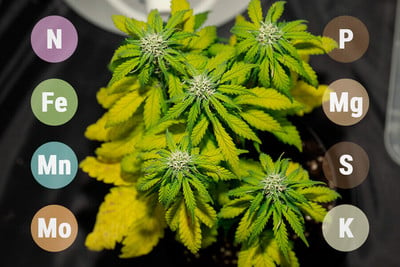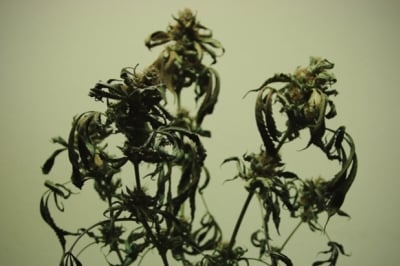 Cannabis Grow Guide by Royal Queen Seeds
Cannabis Grow Guide by Royal Queen Seeds
- Growing cannabis step by step
- Cannabis growing basics
- Choosing your seeds
- How to germinate seeds
- The cannabis vegetative stage
- The cannabis flowering stage
- Harvesting cannabis
- Trimming, drying, and curing
- Choosing pots and soil
-
Growing indoors
- A Complete Overview Of Growing Cannabis Indoors
- Cannabis Cultivation Tips: How To Set Up Indoor Grow Lights
- How Many Cannabis Plants Can You Grow Per Square Metre?
- Indoor Cannabis Growing: Relative Humidity and Temperatures
- Hydroponics Cannabis Growing Guide (with diagrams)
- Cannabis Micro Growing: Growing Great Weed in Tiny Spaces
- Growing outdoors
- How to grow autoflowering cannabis
- Cannabis nutrients and pH
- Cannabis troubleshooting: Nutrients
-
Cannabis troubleshooting: Growing
- Cannabis Seed Germination — Troubleshooting Guide
- How to Deal With Pythium (Root Rot) in Cannabis Plants
- Slow Cannabis Plant Growth And What You Can Do About It
- How to Prevent and Fix Stretching in Cannabis Seedlings
- Watering Your Cannabis: How to Fix Overwatering and Underwatering
- Understanding Male, Female, And Hermaphrodite Cannabis
- Identifying and Treating Common Cannabis Ailments
- How To Revive a Sick Cannabis Plant
- How to Avoid Mouldy Weed During Drying and Curing
- How to Prevent and Treat Dry and Crispy Cannabis Leaves
- What Cannabis Leaves Can Tell You
- Causes and Solutions for Yellow Cannabis Leaves
-
Cannabis Strains Grow Report
- HulkBerry Automatic Grow Report
- Blue Cheese Auto Grow Report
- Purple Punch Automatic Grow Report
- Triple G Automatic Grow Report
- Do-Si-Dos Automatic Grow Report
- Green Gelato Automatic Grow Report
- Haze Berry Automatic Grow Report
- Purple Queen Automatic Grow Report
- Cookies Gelato Automatic Grow Report
- Sherbet Queen Automatic Grow Report
- Sweet Skunk Automatic Grow Report
- Medusa F1 Grow Report
- Cannabis plant training
-
Weed growing tips
- The Cannabis Plant Anatomy
- How to preserve seeds
- How Much Sunlight Do Outdoor Cannabis Plants Need To Grow?
- How to Control and Prevent Stretching in Cannabis Plants
- My Cannabis Plants Are Growing Too Tall: What Should I Do?
- Should You Worry About Purple Or Red Cannabis Stems?
- What To Do When Your Indoor Cannabis Won’t Flower
- How To Protect Your Cannabis Plants From Heat Stress
- How To Tell If Your Female Cannabis Plant Has Been Pollinated
- Growing Medical Marijuana
- Bud Washing: How to Clean Your Weed
- Understanding Cannabis Yield per Plant

How to Prevent and Treat Dry and Crispy Cannabis Leaves
How to fix dry and crispy cannabis leaves.
Contents:
Healthy and vibrant cannabis specimens dominate social media feeds. These thriving plants display firm, dark green fan leaves with a waxy shine protruding from robust and sturdy stems. Every grower strives to achieve plants that look half as healthy. However, things don’t always go to plan.
Have you ever walked into your grow space to see dry, crispy leaves hanging on for dear life? It’s disheartening, and far from the luscious foliage depicted on Instagram. If your leaves are looking a little worse for wear, check out the guide below. We’ll cover every possible cause for the condition, and how to fix it.

What Causes Dry, Crispy Cannabis Leaves?
A problem-solver lies at the heart of every cannabis grower. A large part of harvesting a canopy of healthy buds involves a fair amount of troubleshooting along the way, from nutrient deficiencies to pest invasions. Dry, crispy leaves are one of these potential problems. This occurs when plants lose their moisture content, curl up, and feel fragile and crunchy to the touch. Several environmental factors give rise to this issue—nutrient problems, too much water, and excess heat are just a few of the common culprits.
Fortunately, we’ve identified solutions to all of them. Use the guide below to learn what exactly causes cannabis leaves to turn dry, and what you can do to rescue your plants.
Old Age
Cannabis plants don’t stay young forever. Dry, crispy leaves occur naturally towards the end of a plant’s life cycle. During the late flowering stage, as plants divert most of their resources towards forming resinous buds, you’ll notice some fan leaves start to dry and discolour.
Old age largely affects the lower leaves, but those higher up might also begin to lose their moisture content and luscious green appearance. If your plants are otherwise healthy, pest-free, and enjoying ideal temperatures, chances are they are simply getting old.
Fan leaves will appear particularly dry and frail during flushing—the act of restricting feeding around two weeks before harvest to improve the flavour of the buds. An intentional lack of key nutrients will take a toll on the foliage and often cause many fan leaves to autumn to the ground.

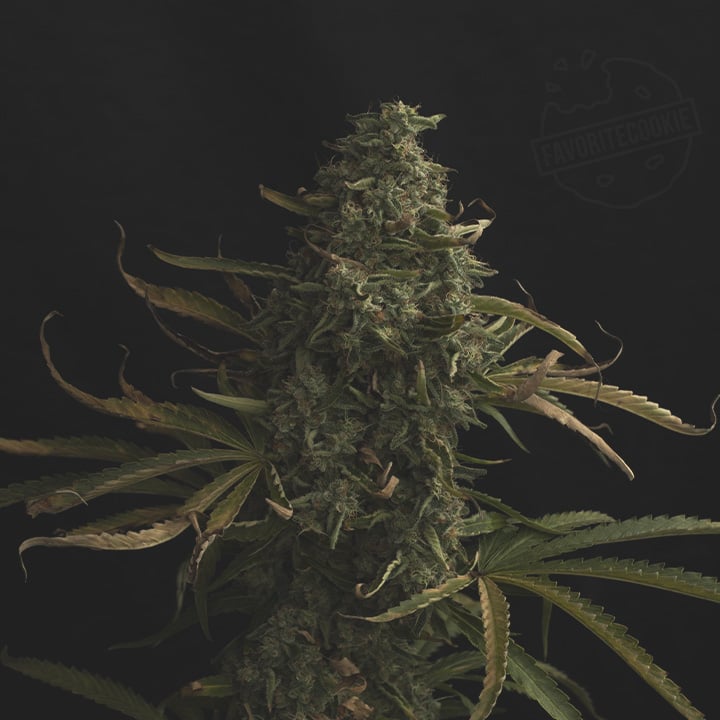
Solution
As a natural phenomenon, you have nothing to worry about. Let nature play its course. Take a clean pair of pruning shears and defoliate the dried and dying leaves to improve canopy aeration and clean up the aesthetics of your plants.
Nutrient Issues
Cannabis plants require a balance of key nutrients to survive and thrive. These natural compounds play vital roles in cannabis physiology, from assisting with photosynthesis to facilitating tissue growth and flowering.
Plants require two key groups of nutrients: macronutrients and micronutrients. As their names suggest, plants require the former in larger quantities and the latter in smaller amounts. Most growers manage to supply their plants with adequate nutrients using either high-quality compost or supplements.
Despite this, plants can still exhibit deficiency symptoms due to pH fluctuations. If the pH of the growing medium becomes too low or too high, plants lose the ability to absorb nutrients. Low levels of molecules such as iron and magnesium—important for chlorophyll formation and enzyme synthesis—can lead to crispy, dry leaves.
A nutrient surplus can also cause dry and damaged fan leaves. Excess nitrogen can burn roots, causing the fan leaves to become extremely dark green and crispy.


Solution
Adjust the pH of your growing medium to restore a healthy balance. Cannabis plants thrive in a pH of between 6.0–7.0, whereas hydroponic plants prefer a pH of 5.5–6.5. Use a pH tester to determine the status of your soil. First, attempt to flush out the growing medium with pH-balanced water and test the growing medium again. If the pH level is still out of whack, apply pH correction products available at any growing shop.
Also, consider adding mycorrhizal fungi to your soil. These beneficial fungi form a mutually beneficial relationship with plant roots, helping them mine for nutrients in return for sugars.
Overwatering
It’s no secret that cannabis needs water to survive. Plants use this precious resource during photosynthesis, to transport nutrients, and to keep them turgid and strong. Yet, as with everything, too much water does more harm than good.
Overwatering usually occurs when beginner growers take too much care of their plants—they see one speck of dry soil and begin to panic. A constant supply of water means fluid begins to pool in the soil. When plants take up too much water, cells within the leaves bulge and eventually rupture. This causes crusting at the tips and a crispy complexion. Not to mention, excess water creates a breeding ground for damaging fungi, and it flushes valuable nutrients from the soil.


Solution
Water your plants intelligently. A slight dryness in the soil is actually a good thing. As a rule of thumb, only water your plant again once the top five centimetres are dry. To keep better track of things, weigh your pots when they’re dry and again when fully watered. Wait for your pots to get close to their dry weight before watering again.
Pests and Fungi
Humans aren’t the only Earthbound creatures with a penchant for pot. Many different species of microbes, insects, and mould all enjoy savouring the taste of fresh cannabis plants. Aphids, caterpillars, and slugs all like to graze on cannabis leaves, whereas plant-parasitic nematodes prefer the taste of roots. Fungi will settle just about anywhere on the plant, as long as it provides them with their favourite conditions—dampness and humidity.
Cannabis plants can take a bit of pest damage, and the presence of a few insects indicates strong biodiversity within the garden. But prolonged and intense assaults can cause them a great deal of stress, possibly resulting in dry and crispy leaves.


Solution
Protect your plants! Different species require different tactics. Use predatory insects such as ladybugs, parasitic wasps, and praying mantis to keep pest species at bay. For a second line of defence, sow companion plants such as dill, sweet basil, sunflower, and lavender early in the season to repel and distract damaging insects.
Do you have a feeling your roots are under attack? Inoculate your soil with mycorrhizal fungi; their fine filaments—hyphae—tie down and trap gnawing nematodes. And what about that pesky mould? Simple. Keep your plants aerated with fans or a natural breeze. Avoid overwatering the soil and cover up your crop to protect it from downpours during flowering.
Excessive Heat
Heat has a tendency to make things crispy: bacon, toast, even our skin after too much time on the beach. Leave your cannabis plants exposed under the baking sun in a greenhouse or garden, and you’ll find their fan leaves take on this property, too. Intense heat will cause leaves to lose moisture, dry out, and shrivel up.


Solution
If you’re growing outdoors in a particularly hot region, be prepared to defend your plants from a heatwave. Keep some shade cloth and a few stakes on standby, and deploy a DIY setup if the sun beats down harshly for too long.
If you find your grow room becomes unbearably hot, use fans and air conditioning to bring the temperature down. You can even use a sensor and controller rigged up to an exhaust fan to automate this function.
Light Burn
Another pillar of plant life, light enables cannabis plants to create their own energy. Without light, you can say goodbye to cannabis buds altogether. Yet, too much light will burn the upper areas of your plant, causing leaves to crisp over and even damaging high-flying colas. If you let your canopy grow too tall, expect discolouration, dryness, and reduced yields.


Solution
Monitor your indoor grow closely. Move your light system up as your plant continues to work its way upwards. If you’re dealing with limited space, use LST and ScrOG techniques to keep your canopy lower to the ground without sacrificing output.
LED lights are becoming more popular among cannabis growers. As well as being cheaper to run, these lights emit less heat and offer more room for error if your plants grow a tad out of control.
Treating Dry, Crispy Leaves on Weed Plants
If you notice fan leaves becoming crispy and dry, don’t panic! Take on the problem with a level head and remember what you’ve just learned. Revisit our guide, identify the problem, and utilise the correct treatment. If you act efficiently, you’ll rescue your plants, solve a horticultural problem, and become a better grower all at the same time.
 Grow Guide Topic Finder
Grow Guide Topic Finder
- Growing cannabis step by step
- Cannabis growing basics
- Choosing your seeds
- How to germinate seeds
- The cannabis vegetative stage
- The cannabis flowering stage
- Harvesting cannabis
- Trimming, drying, and curing
- Choosing pots and soil
-
Growing indoors
- A Complete Overview Of Growing Cannabis Indoors
- Cannabis Cultivation Tips: How To Set Up Indoor Grow Lights
- How Many Cannabis Plants Can You Grow Per Square Metre?
- Indoor Cannabis Growing: Relative Humidity and Temperatures
- Hydroponics Cannabis Growing Guide (with diagrams)
- Cannabis Micro Growing: Growing Great Weed in Tiny Spaces
- Growing outdoors
- How to grow autoflowering cannabis
- Cannabis nutrients and pH
- Cannabis troubleshooting: Nutrients
-
Cannabis troubleshooting: Growing
- Cannabis Seed Germination — Troubleshooting Guide
- How to Deal With Pythium (Root Rot) in Cannabis Plants
- Slow Cannabis Plant Growth And What You Can Do About It
- How to Prevent and Fix Stretching in Cannabis Seedlings
- Watering Your Cannabis: How to Fix Overwatering and Underwatering
- Understanding Male, Female, And Hermaphrodite Cannabis
- Identifying and Treating Common Cannabis Ailments
- How To Revive a Sick Cannabis Plant
- How to Avoid Mouldy Weed During Drying and Curing
- How to Prevent and Treat Dry and Crispy Cannabis Leaves
- What Cannabis Leaves Can Tell You
- Causes and Solutions for Yellow Cannabis Leaves
-
Cannabis Strains Grow Report
- HulkBerry Automatic Grow Report
- Blue Cheese Auto Grow Report
- Purple Punch Automatic Grow Report
- Triple G Automatic Grow Report
- Do-Si-Dos Automatic Grow Report
- Green Gelato Automatic Grow Report
- Haze Berry Automatic Grow Report
- Purple Queen Automatic Grow Report
- Cookies Gelato Automatic Grow Report
- Sherbet Queen Automatic Grow Report
- Sweet Skunk Automatic Grow Report
- Medusa F1 Grow Report
- Cannabis plant training
-
Weed growing tips
- The Cannabis Plant Anatomy
- How to preserve seeds
- How Much Sunlight Do Outdoor Cannabis Plants Need To Grow?
- How to Control and Prevent Stretching in Cannabis Plants
- My Cannabis Plants Are Growing Too Tall: What Should I Do?
- Should You Worry About Purple Or Red Cannabis Stems?
- What To Do When Your Indoor Cannabis Won’t Flower
- How To Protect Your Cannabis Plants From Heat Stress
- How To Tell If Your Female Cannabis Plant Has Been Pollinated
- Growing Medical Marijuana
- Bud Washing: How to Clean Your Weed
- Understanding Cannabis Yield per Plant


























